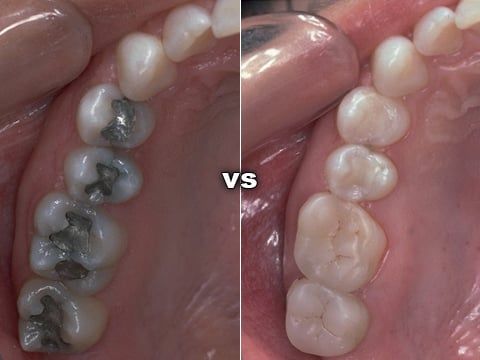Cosmetic
One of the most requested procedures asked of a dental office is tooth whitening. This is a procedure that will assist in removing stains and discoloration from teeth while lightening them.
Tooth whitening can only be completed once cavities are treated in order to prevent the whitening solution from reaching the inner tooth and causing sensitivity. Also keep in mind that tooth whitening is unable to lighten exposed tooth roots and tooth replacements such as crowns and veneers.
Whitening your teeth at home often involves using a custom fitted mouth guard into which a whitening solution is placed. These custom fitted mouth guards will help protect your gums from irritation that occurs while using ill-fitted over-the-counter whitening mouth pieces. After the solution is placed in the mouth guard, it is placed over the teeth and left on for a few hours or overnight depending on the type of whitening solution. Ask Dr. Mireles if home whitening is right for you.
Single visit whitening uses a special light that is able to activate a higher concentration of whitening solution in order to produce quicker and more dramatic results. Our technicians protect your mouth very carefully and the whole process takes around an hour.
Bonding is among the easiest and least expensive of cosmetic dental procedures.
The composite resin used in bonding can be shaped and polished to match the surrounding teeth.
Most often, bonding is used for cosmetic purposes:
- To improve the appearance of a discolored or chipped tooth
- To close slight spaces between teeth
- To make teeth look longer
- Or to change the shape or color of teeth
In order to make a filling appear almost invisible to the naked eye, composite fillings are often used. These fillings are designed to match your natural tooth color and are bonded to your teeth, which makes them less likely to fall out. These fillings are used to replace older fillings made of silver or gold. Tooth colored fillings have a more aesthetic appearance, can be completed in one visit, form a strong seal and are less likely to crack a tooth.
What is a dental Veneer?
A veneer procedure is a popular cosmetic procedure. Porcelain is known as one of the best materials for esthetic dental procedures, because it mimics tooth enamel very closely. Veneers are extremely thin (usually less than 0.5 mm thickness), giving them enamel-like translucency, creating a natural appearance. They are about as thick as a contact lens. There is very little tooth preparation before the veneer application.
Porcelain veneers are attached to your teeth using a dental bonding glue or cement. Although veneers are very thin, once bonded to your teeth they become strong. The process is fast and conservative. First, your teeth are prepared and impressions are sent to a dental laboratory along with the design for your new smile. Veneers may be recommended along with other cosmetic procedures in order to produce optimum results.
Veneer Procedure Steps:
- Your teeth are cleaned so that only your natural tooth is exposed. Old surface restorations are removed.
- In some cases the tooth is etched so the veneers will adhere more easily.
- An impression is taken of the tooth area where the veneers are to be placed and sent to the lab for fabrication.
- When the veneers are ready, your dentist will check the fit along with its future appearance, then permanently bond them to your teeth.
- After the veneer is set, it is shaped and polished to look like a natural tooth and fall in line with surrounding teeth.
Veneer Procedure Benefits:
- You can have your porcelain veneers and a beautiful new smile in as little as just two office visits!
- Very little tooth alteration to your natural teeth and does not affect neighboring teeth.
- Gap space between teeth can be closed without the use of braces.
- Veneers can add tooth length to worn down teeth.
- Veneers can add tooth shape and thickness.
- Veneers can cover broken or chipped teeth so that they look like healthy normal teeth.
- Veneers can renew the color of stained teeth.
- There is no dark line at the base of the tooth like some dental crowns occasionally have.
- The porcelain material is stain-resistant for lasting beauty and integrity.
Porcelain Veneers vs. Lumineers
- Lumineers is a specific brand of porcelain veneers, which use a patented porcelain material known as Cerinate. They are even thinner than traditional veneers.
- Lumineers require very little or no tooth reduction. They are a great choice if your teeth only need minor changes, to if they are set back slightly.
- Traditional veneers may be a better choice if you are looking to make more dramatic changes.


